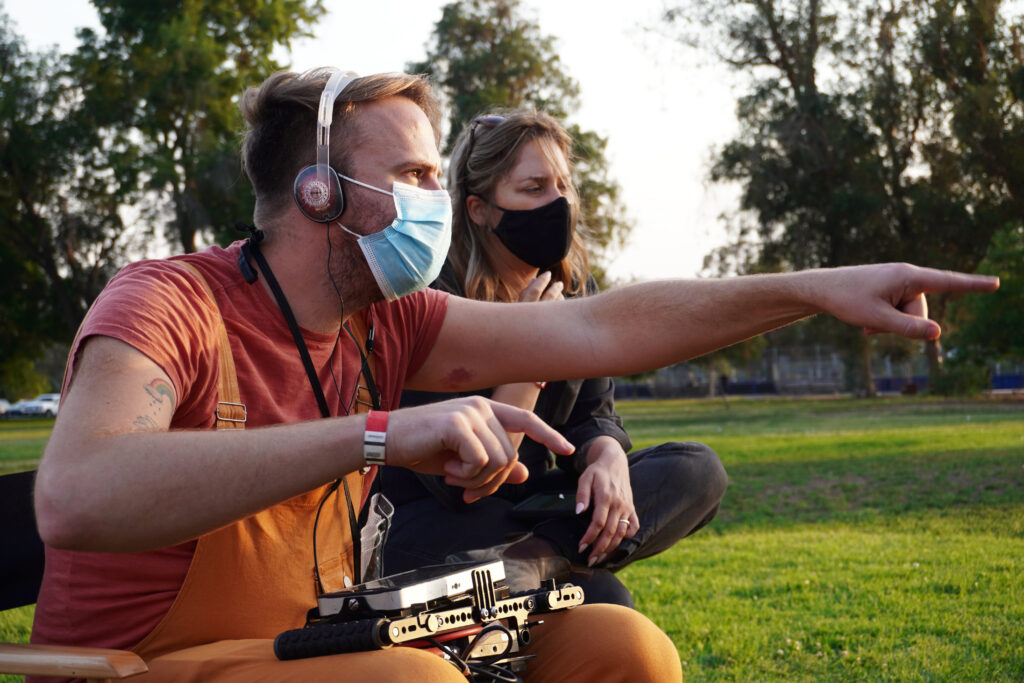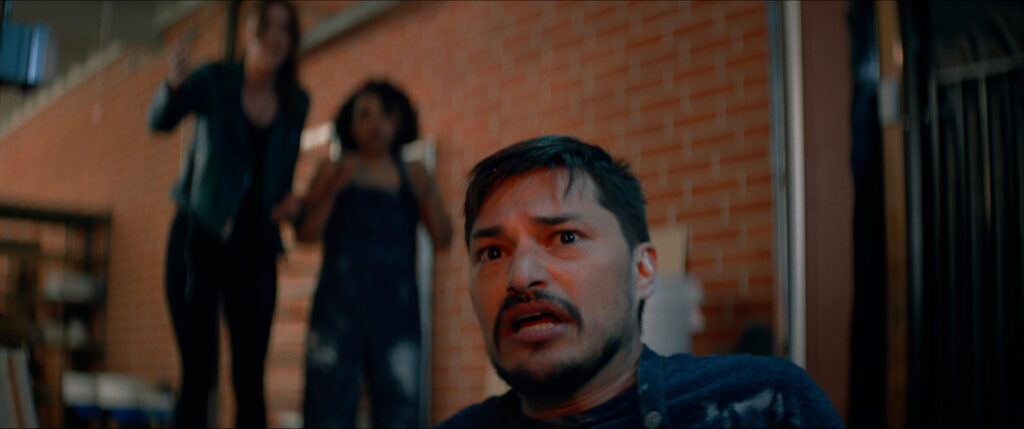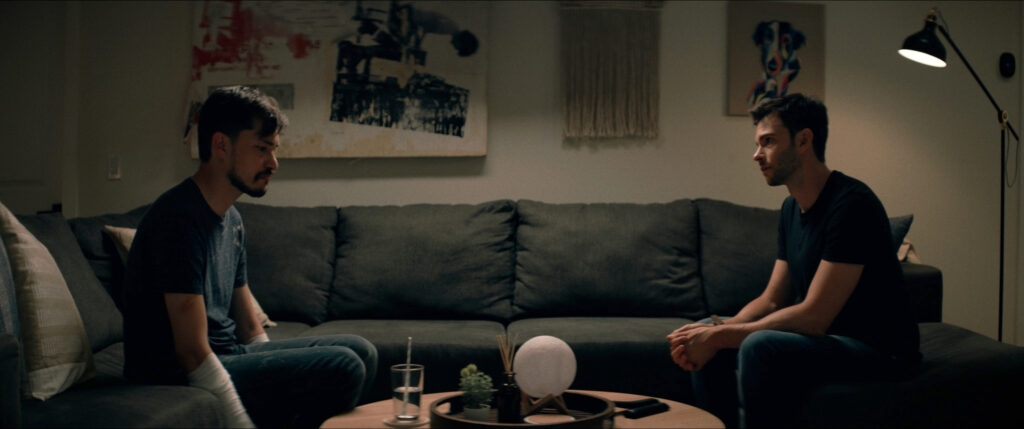Addison Heimann describes what went into making Hypochondriac
** This conversation contains spoilers for the movie Hypochondriac.
The reviews for the psychological queer horror film Hypochondriac have been very favorable so we wanted to sit down with writer/director Addison Heimann to get some additional insight into the movie.
Based on Heimann’s own mental breakdown, Hypochondriac tells the story of a Latino potter named Will. He’s got a great job, good friends and a loving boyfriend but when his bipolar mother resurfaces in his life after being put into a mental institution ten years prior, he begins to exhibit unexplainable symptoms that blur the line between fantasy and reality. We follow Will’s descent into madness as he tries desperately to uncover the mystery behind his symptoms…
Queer Forty: Hi Addison! Congratulations on the release of Hypochondriac and the positive reviews! Can you tell us, in your own words, what inspired you to write and make this film?
Addison Heimann: The beginning of the movie is based on a real breakdown, well…my mental breakdown. The short version is I lost full function of my arms for six months after an injury at work and I couldn’t shave, I couldn’t lift the phone, I couldn’t eat food with a fork, and Doctor Google told me that I was dying of ALS, which I wholeheartedly believed. And my mother, who’s bipolar, was leaving me voicemails telling me not to trust my friend; so that kind of confluence basically made me crack.
I started writing the initial draft of the film as a way to bring myself out of that headspace at the urging of my physical therapist. So, despite the pain I was in, I put two pillows on my desk with two ice packs on my arms and moved my computer against the wall, all so I could physically write. The dog poster featured in the film “Be bright like glitter and bubbly like champagne” was actually the calendar that I had up on my wall at the time, which I stared at for six months because I didn’t have the strength to literally flip the page to the next month.
Anyway, I wrote the first 10-15 pages of a of a really bad version of what would ultimately end up being this script. Initially it was just an accurate retelling of what happened with my arms, but ultimately, I realized the hypochondria I experienced was a symptom of an underlying disease. I had a legitimate injury but all this “stuff” that caused me to spiral, thinking I was dying, was basically a distraction so I didn’t have to face all the psychological trauma my mother put me through as a kid. Once I was able to realize that I was able to focus the script and also focus my mind to tell more of an emotional recounting of what it was like to breakdown.

HYPOCHONDRIAC | Photo: XYZ Films
Sounds like the ultimate catharsis. Out of curiosity, did you also suffer from hallucinations like Will did?
Heimann: No, I didn’t have any hallucinations, that was movie magic. I suffer from OCD with catastrophic intrusive thoughts that can cause me to spiral and lead to debilitating anxiety.
What is real in the script are the mother’s voicemails, which are like transcriptions from the messages I received. The scenes with my father are pretty accurate. I didn’t have a boyfriend at the time, but Luke was a combination of a of bunch of other people.
I see. I’m glad you didn’t have to suffer through the hallucinations because they were pretty frightening! Now, I’m sure you’ve heard this but I’m a child of the 90’s, so I for one appreciated all the cultural references to my childhood. I mean the casting choices were delightful: Debra Wilson from MadTV, Madeline Zima from The Nanny and Adam Busch from Buffy the Vampire Slayer! And the nods to Ghost and Donnie Darko. Tell me about these choices and the style of the film. Was it all intentional?
Heimann: Oh yes, it’s definitely intentional! I grew up on Donny Darko, it was very much an homage. It has this total “all over the place” quality which I love. You have Patrick Swayze acting a fool and the teacher in sparkle motion and Donnie on the bed asking his mom how it feels to have a whako for a son and her saying “It feels faaantastic”. All such great stuff.
Stylistically, we pulled from the ’70s, ’80s and ’90s. We referenced [Italian horror-thriller] giallo films a lot using deliberate zooms, cross fades, blurs and fracturing. All that stuff is very much of an older time.
The Ghost sequence, which is probably one of my favorite sequences in the movie, was definitely deliberate. I just could not include pottery in this movie without having the man in the wolf costume make pottery with his human (laughs). It’s haunting, gory, bloody and ridiculous.

Amazing!! It’s such a highlight moment of the film. Bizarre, sexy, bloody- good stuff! I was excited that this was a queer led horror film, but even happier to find out that the lead character was Latino. Representation is so important. I wanted to ask you if Will was always written to be Latino?
Heimann: Well, I’m Puerto Rican so yeah that’s why I did it (laughs), but I’m white passing. My mother’s Puerto Rican. In terms of the power of representation, Will just existing on screen as a gay Latino man is ultimately the most important thing.
I couldn’t agree more. So, I take it that the wolf is the representation of Will’s inner child. Can you speak to that and what it means to the overall message of the film?
Heimann: The wolf is definitely the manifestation of his childhood trauma, but for me the bigger idea was if the wolf could be tamed?
Will is ignoring his problem. He’s trying to resolve symptoms of an underlying disease that he’s not yet acknowledged, and this is what the wolf kind of represents. So yeah, when he first appears he’s in a scary mask telling Will “Hey! I’m here’. When Will basically ignores him, the wolf gets more grotesque. He grows up and turns into this monstrous creature. It’s not like he’s inherently bad but because Will is not acknowledging the things that he’s doing to make things worse or even just acknowledging the fact that he needs help because of his mother is what causes him to grow more ferocious.

HYPOCHONDRIAC | Photo: XYZ Films.
It causes Will to injure himself in the kiln scene and by the end he’s got a knife in his hand because the wolf has no idea what to do to make it end. Ultimately, when he’s finally acknowledged it, the wolf basically regresses back into a child.
The metaphor is helpful in my mind because I deal with my wolf every day. He’s always there. I may not see him, but I know he’s there and that’s OK because I’ve acknowledged him, and I’ve learned to live with him.
With mental health it’s a constant battle, and you can revert, you can regress but hopefully you keep building the tools you need to cope, and you keep going forward to the point where it’s OK and you can survive with it. We have to be able to acknowledge the fact that we are constantly in struggle with these types of things because if we don’t, we will be suffering in silence. I think if we just acknowledge the fact that these problems exist, we will go through a realization process that will lead to more empathy and kindness, something the world is in sore need for right now. That is what the wolf storyline represents to me.
A beautiful sentiment in an equally terrifying package. That’s the definition of horror. Thank you, Addison, for taking the time to speak with us. I’m looking forward to what you come out with next!
Hypochondriac is available on VOD August 4.






